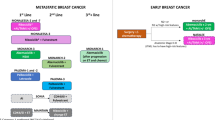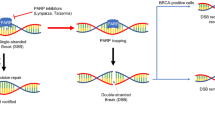Abstract
Capecitabine is frequently used in the treatment of recurrent/progressive metastatic breast cancer (MBC) after prior anthracycline and taxane therapy. With the intention of improving the efficacy of single agent capecitabine, we initiated a randomized, double-blind, placebo-controlled Phase II study of the novel serine/threonine kinase inhibitor enzastaurin in combination with capecitabine in a heavily pretreated patient population. Patients received capecitabine 1,250 mg/m2 twice daily plus enzastaurin 500 mg/day, or capecitabine plus placebo. The capecitabine was administered for the first 14 days of each 21 day cycle. The primary outcome was progression-free survival (PFS) using the log-rank test (1-sided significance level of 0.20). Of 109 patients assessed for eligibility, 85 were enrolled, randomized, and treated (42 and 43 patients in each respective treatment group). The study was terminated early following a preplanned futility analysis. Median PFS (95% CI) was 2.8 (2.1–4.6) months with capecitabine plus enzastaurin versus 4.3 (2.9–6.2) months with capecitabine plus placebo (adjusted hazard ratio: 1.728 [1.00–2.97]; P = 0.048). Median overall survival (95% CI) was lower with capecitabine plus enzastaurin than with capecitabine plus placebo (9.9 [7.0–16.6] months vs 14.9 [9.9–19.3] months, P = 0.181). Grade 3/4 adverse events were more frequent with capecitabine plus enzastaurin (42.9% vs 32.6%). Given the lack of PFS benefit, capecitabine plus enzastaurin is unsuitable as therapy for patients with recurrent/progressive MBC after prior anthracycline and taxane therapy. This trial is registered on www.clinicaltrials.gov (identifier: NCT00437294).


Similar content being viewed by others
References
Moreno-Aspitia A, Perez EA (2009) Treatment options for breast cancer resistant to anthracycline and taxane. Mayo Clin Proc 84:533–545
Henderson IC, Berry DA, Demetri GD, Cirrincione CT, Goldstein LJ, Martino S, Ingle JN, Cooper MR, Hayes DF, Tkaczuk KH et al (2003) Improved outcomes from adding sequential Paclitaxel but not from escalating Doxorubicin dose in an adjuvant chemotherapy regimen for patients with node-positive primary breast cancer. J Clin Oncol 21:976–983
Walko CM, Lindley C (2005) Capecitabine: a review. Clin Ther 27:23–44
Barnett CM (2009) Survival data of patients with anthracycline- or taxane-pretreated or resistant metastatic breast cancer. Pharmacotherapy 29:1482–1490
Thomas ES, Gomez HL, Li RK, Chung HC, Fein LE, Chan VF, Jassem J, Pivot XB, Klimovsky JV, de Mendoza FH et al (2007) Ixabepilone plus capecitabine for metastatic breast cancer progressing after anthracycline and taxane treatment. J Clin Oncol 25:5210–5217
Miller KD, Chap LI, Holmes FA, Cobleigh MA, Marcom PK, Fehrenbacher L, Dickler M, Overmoyer BA, Reimann JD, Sing AP et al (2005) Randomized phase III trial of capecitabine compared with bevacizumab plus capecitabine in patients with previously treated metastatic breast cancer. J Clin Oncol 23:792–799
von Minckwitz G, du Bois A, Schmidt M, Maass N, Cufer T, de Jongh FE, Maartense E, Zielinski C, Kaufmann M, Bauer W et al (2009) Trastuzumab beyond progression in human epidermal growth factor receptor 2-positive advanced breast cancer: a german breast group 26/breast international group 03–05 study. J Clin Oncol 27:1999–2006
Cameron D, Casey M, Press M, Lindquist D, Pienkowski T, Romieu CG, Chan S, Jagiello-Gruszfeld A, Kaufman B, Crown J et al (2008) A phase III randomized comparison of lapatinib plus capecitabine versus capecitabine alone in women with advanced breast cancer that has progressed on trastuzumab: updated efficacy and biomarker analyses. Breast Cancer Res Treat 112:533–543
Barrios CH, Liu MC, Lee SC, Vanlemmens L, Ferrero JM, Tabei T, Pivot X, Iwata H, Aogi K, Lugo-Quintana R et al (2010) Phase III randomized trial of sunitinib versus capecitabine in patients with previously treated HER2-negative advanced breast cancer. Breast Cancer Res Treat 121:121–131
Sledge GW Jr, Gökmen-Polar Y (2006) Protein kinase C-beta as a therapeutic target in breast cancer. Semin Oncol 33:S15–S18
Graff JR, McNulty AM, Hanna KR, Konicek BW, Lynch RL, Bailey SN, Banks C, Capen A, Goode R, Lewis JE et al (2005) The protein kinase Cbeta-selective inhibitor, Enzastaurin (LY317615.HCl), suppresses signaling through the AKT pathway, induces apoptosis, and suppresses growth of human colon cancer and glioblastoma xenografts. Cancer Res 65:7462–7469
Eli Lilly and Company (2005) Investigator’s brochure. LY317615 (enzastaurin)
Robertson MJ, Kahl BS, Vose JM, de Vos S, Laughlin M, Flynn PJ, Rowland K, Cruz JC, Goldberg SL, Musib L et al (2007) Phase II study of enzastaurin, a protein kinase C beta inhibitor, in patients with relapsed or refractory diffuse large B-cell lymphoma. J Clin Oncol 25:1741–1746
Camidge DR, Gail Eckhardt S, Gore L, O’Bryant CL, Leong S, Basche M, Holden SN, Musib L, Baldwin J, Darstein C et al (2008) A phase I safety, tolerability, and pharmacokinetic study of enzastaurin combined with capecitabine in patients with advanced solid tumors. Anticancer Drugs 19:77–84
National Cancer Institute (NCI) (2003) Common Terminology Criteria for Adverse Events v3.0 (CTCAE). http://ctep.cancer.gov/protocoldevelopment/electronic_applications/docs/ctcaev3.pdf. Accessed July 10, 2006
Therasse P, Arbuck SG, Eisenhauer EA, Wanders J, Kaplan RS, Rubinstein L, Verweij J, Van GM, van Oosterom AT, Christian MC et al (2000) New guidelines to evaluate the response to treatment in solid tumors. European Organization for Research and Treatment of Cancer, National Cancer Institute of the United States, and National Cancer Institute of Canada. J Natl Cancer Inst 92:205–216
Ansari J, Palmer DH, Rea DW, Hussain SA (2009) Role of tyrosine kinase inhibitors in lung cancer. Anticancer Agents Med Chem 9:569–575
Mok TS, Wu YL, Thongprasert S, Yang CH, Chu DT, Saijo N, Sunpaweravong P, Han B, Margono B, Ichinose Y et al (2009) Gefitinib or carboplatin–paclitaxel in pulmonary adenocarcinoma. N Engl J Med 361:947–957
Roche Laboratories, Inc. (1999) Xeloda (capecitabine) label information. http://www.accessdata.fda.gov/drugsatfda_docs/label/2005/020896s016lbl.pdf. Accessed May 17, 2010
Reigner B, Verweij J, Dirix L, Cassidy J, Twelves C, Allman D, Weidekamm E, Roos B, Banken L, Utoh M et al (1998) Effect of food on the pharmacokinetics of capecitabine and its metabolites following oral administration in cancer patients. Clin Cancer Res 4:941–948
Vrdoljak E, Mise BP, Lukic B, Curic Z, Boskovic L, Tica I (2010) Long-lasting control of triple-negative metastatic breast cancer with the novel drug combination ixabepilone and capecitabine—case report. Onkologie 33:53–56
Li L, Li J, Yang K, Tian J, Sun T, Jia W, Zhang P, Yi K (2010) Ixabepilone plus capecitabine with capecitabine alone for metastatic breast cancer. Future Oncol 6:201–207
Pronzato P (2008) New therapeutic options for chemotherapy-resistant metastatic breast cancer: the epothilones. Drugs 68:139–146
Frye DK (2010) Advances in breast cancer treatment: the emerging role of ixabepilone. Expert Rev Anticancer Ther 10:23–32
Acknowledgments
Study sponsorship was provided by Eli Lilly and Company. We thank Jo Wood (Meditech Media Asia Pacific Pty Ltd) for provision of medical writing support. The contributions of all of the investigators, assistants, and patients that participated in this study are also gratefully acknowledged.
Conflict of interest
Mark Clemons and Karen Gelmon have served on advisory boards for Roche. Anil A. Joy has previously served on advisory boards for and has received honoraria from Roche and Eli Lilly (neither of which pertained to the therapeutic agents and/or conduct of this trial). Neill Iscoe is an employee and shareholder of Eli Lilly and Company. Radhi Abdulnabi, Johan P. Jordaan, Mauricio Kotliar, and Jodi Lynch have no conflicts of interest to disclose.
Author information
Authors and Affiliations
Corresponding author
Rights and permissions
About this article
Cite this article
Clemons, M., Joy, A.A., Abdulnabi, R. et al. Phase II, double-blind, randomized trial of capecitabine plus enzastaurin versus capecitabine plus placebo in patients with metastatic or recurrent breast cancer after prior anthracycline and taxane therapy. Breast Cancer Res Treat 124, 177–186 (2010). https://doi.org/10.1007/s10549-010-1152-0
Received:
Accepted:
Published:
Issue Date:
DOI: https://doi.org/10.1007/s10549-010-1152-0




